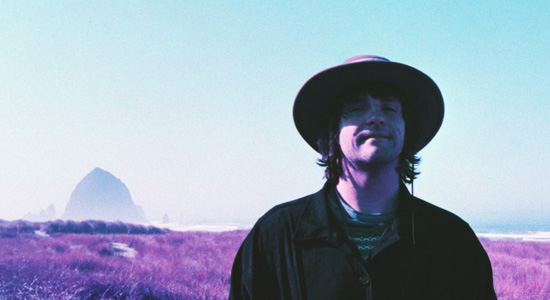
Jackson Boone’s Natural Changes is a beautiful trip
The first spin of Portland, Ore., songwriter Jackson Boone’s sophomore album, Natural Changes, rings a lot of familiar historical bells. There’s some of the space and shine of the Brians (Jones and Wilson), a little Revolver-style rattle and boogie, and a whirl of vocal and guitar e ffects that makes the LP shimmer like a shallow pond when the wind’s high. But the more you listen to it, the less—weirdly—it sounds like it can be encapsulated in a term like “psychedelic,” which is where Boone’s music press has tended to drift.
“I’m really glad to hear you say that,” says Boone. “There was a press piece recently titled ‘Jackson Boone ignites psychedelic revolution!’ And I thought, ‘Oh man, that’s kind of over the top.’ I’m just trying to make really pretty, groovy music.” Pause; then, cheekily: “I don’t even take psychedelics anymore.”
What Boone did to prep for making the album was set up shop in a beach house on the Oregon coast, where he and producer Riley Geare spent time “tucked away in nature, by our lonesome, and the vibe (of the music) eventually became this really cohesive and pretty one.”
Boone talks a lot about the “vibe” of his music—the feel of it in the studio as it comes together, or onstage in a night’s performance. It’s a useful word to employ in relation to Natural Changes, which, anchored by slow-burn centerpiece “Lovely Low,” swells and recedes over its 40-minute run-time like a tide cycle. Of the album’s grander “high tide” cuts, the towering “Open” is the most immediately impressive and revealing of Boone’s aesthetic: a vast, echoing tangle of guitars, keys, percussion and e ffects-draped vocals that pours from the speakers with slow, stately grace.
There are other flourishes, too—the Nick Drake-style title track album closer, for example—indicating that Boone’s less a psychedelic revivalist than a songwriter whose arrangements naturally tend to the grand and majestic. “Riley and I were both into recordings with depth and sonic atmosphere,” he says, “like War On Drugs, Kurt Vile, that kind of thing. The word ‘lush’—that was our go-to word here.”
—Eric Waggoner






